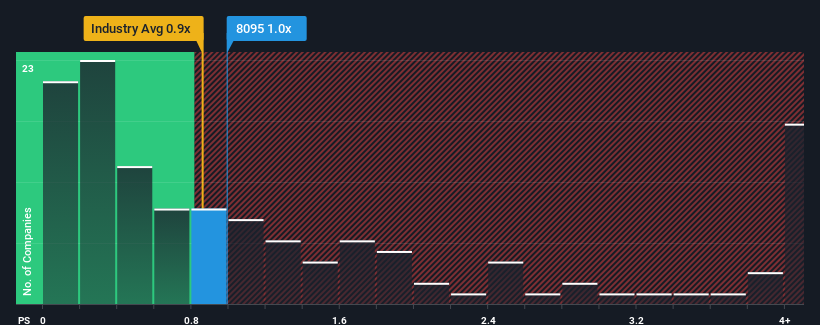
Beijing Beida Jade Bird Universal Sci-Tech Company Limited (HKG:8095) shares have continued their recent momentum with a 31% gain in the last month alone. Looking back a bit further, it's encouraging to see the stock is up 26% in the last year.
Following the firm bounce in price, when almost half of the companies in Hong Kong's Industrials industry have price-to-sales ratios (or "P/S") below 0.5x, you may consider Beijing Beida Jade Bird Universal Sci-Tech as a stock probably not worth researching with its 1x P/S ratio. Although, it's not wise to just take the P/S at face value as there may be an explanation why it's as high as it is.
Check out our latest analysis for Beijing Beida Jade Bird Universal Sci-Tech

What Does Beijing Beida Jade Bird Universal Sci-Tech's Recent Performance Look Like?
With revenue growth that's exceedingly strong of late, Beijing Beida Jade Bird Universal Sci-Tech has been doing very well. It seems that many are expecting the strong revenue performance to beat most other companies over the coming period, which has increased investors’ willingness to pay up for the stock. You'd really hope so, otherwise you're paying a pretty hefty price for no particular reason.
We don't have analyst forecasts, but you can see how recent trends are setting up the company for the future by checking out our free report on Beijing Beida Jade Bird Universal Sci-Tech's earnings, revenue and cash flow.Is There Enough Revenue Growth Forecasted For Beijing Beida Jade Bird Universal Sci-Tech?
In order to justify its P/S ratio, Beijing Beida Jade Bird Universal Sci-Tech would need to produce impressive growth in excess of the industry.
Retrospectively, the last year delivered an exceptional 31% gain to the company's top line. Revenue has also lifted 14% in aggregate from three years ago, mostly thanks to the last 12 months of growth. So we can start by confirming that the company has actually done a good job of growing revenue over that time.
Comparing the recent medium-term revenue trends against the industry's one-year growth forecast of 11% shows it's noticeably less attractive.
With this information, we find it concerning that Beijing Beida Jade Bird Universal Sci-Tech is trading at a P/S higher than the industry. It seems most investors are ignoring the fairly limited recent growth rates and are hoping for a turnaround in the company's business prospects. Only the boldest would assume these prices are sustainable as a continuation of recent revenue trends is likely to weigh heavily on the share price eventually.
What Does Beijing Beida Jade Bird Universal Sci-Tech's P/S Mean For Investors?
Beijing Beida Jade Bird Universal Sci-Tech shares have taken a big step in a northerly direction, but its P/S is elevated as a result. We'd say the price-to-sales ratio's power isn't primarily as a valuation instrument but rather to gauge current investor sentiment and future expectations.
The fact that Beijing Beida Jade Bird Universal Sci-Tech currently trades on a higher P/S relative to the industry is an oddity, since its recent three-year growth is lower than the wider industry forecast. When we see slower than industry revenue growth but an elevated P/S, there's considerable risk of the share price declining, sending the P/S lower. Unless the recent medium-term conditions improve markedly, it's very challenging to accept these the share price as being reasonable.
You should always think about risks. Case in point, we've spotted 1 warning sign for Beijing Beida Jade Bird Universal Sci-Tech you should be aware of.
Of course, profitable companies with a history of great earnings growth are generally safer bets. So you may wish to see this free collection of other companies that have reasonable P/E ratios and have grown earnings strongly.
Have feedback on this article? Concerned about the content? Get in touch with us directly. Alternatively, email editorial-team (at) simplywallst.com.
This article by Simply Wall St is general in nature. We provide commentary based on historical data and analyst forecasts only using an unbiased methodology and our articles are not intended to be financial advice. It does not constitute a recommendation to buy or sell any stock, and does not take account of your objectives, or your financial situation. We aim to bring you long-term focused analysis driven by fundamental data. Note that our analysis may not factor in the latest price-sensitive company announcements or qualitative material. Simply Wall St has no position in any stocks mentioned.